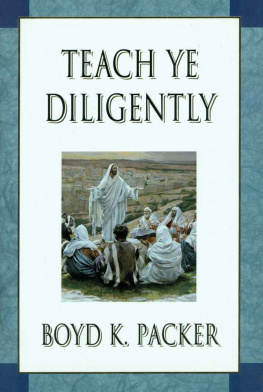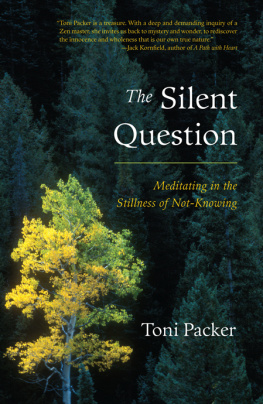Memorable Stories and Parables
Boyd K. Packer
1997 Boyd K Packer.
All rights reserved. No part of this book may be reproduced in any form or by any means without permission in writing from the publisher, Deseret Book Company, P.O. Box 30178, Salt Lake City Utah 30178. This work is not an official publication of The Church of Jesus Christ of Latter-day Saints. The views expressed herein are the responsibility of the author and do not necessarily represent the position of the Church or of Deseret Book. Deseret Book is a registered trademark of Deseret Book Company.
A Still, Small Voice
In the early days of their marriage my father and mother lived on a little farm at Corinne. It was very difficult to raise crops, so they were very poor.
One morning, my father had to go into town. He had broken a piece of farm equipment and it had to be welded before he could continue planting. He came to the house and told Mother he must go to the blacksmith in Brigham City, a distance of seven miles. Although Mother was in the middle of doing the weekly washing, she quickly made arrangements to go with him, for it was not often that she could go to town.
On the cook stove in the kitchen she had been heating water for the washing. She also had a kettle of water heating on top of a little stove in the bedroom. While she set her washing things aside, banked the fires, and quickly got the little children ready for the trip to town, she thought of all the things she could do while Father was at the blacksmith's.
In the meantime Father harnessed the horse and brought the buggy to the front gate. Mother hurried out with the children and lifted them into the buggy. As she began to climb into the buggy herself, she hesitated a moment and then said, "I think I won't go with you today."
"What's the matter?" Father asked.
"I don't know," she answered. "I just have the feeling that I shouldn't go."
When she said feeling, that meant something to my father. He was wise enough not to tease her or try to talk her out of it. He simply said, "Well, if you have that feeling, perhaps you had better stay home."
As she lifted the children out of the buggy, you can imagine what they did!
She watched Father as the buggy went down the road then clattered across the bridge over the Bear River, up the bank on the opposite side, and out of sight. She stood at the gate with the children, who were crying in disappointment, and said to herself, "Now, wasn't that silly of me?"
She returned to the little house with the thought of finishing the washing.
I should tell you that that was a very humble home. The ceiling was not wood or plaster, but was made of cloth stretched and sized with glue and then wallpapered. They did that in homes in those days-not in the expensive homes but in the very humble homes.
The chimney pipe of the little stove in the bedroom was insulated with a brass ring at the point where it went through the fabric ceiling. No one knew that above the ceiling the pipe had rusted through. Now, sparks had escaped into the attic and settled into the dust. Mother had been back in the home only a few minutes when she smelled smoke and found the ceiling afire.
The little youngsters formed a bucket brigade from the pump. Mother stood on a chair and threw the water to the ceiling, and soon the fire was out.
And so the incident closes, except to ask the very important question: Why didn't she go to town that day?
Father and Mother had prayed earnestly that the Lord would bless them to be able to raise their family-feed them, clothe them, and provide shelter for them. They had been saving money to pay for their farm, and their savings were hidden away in that little house. All they owned was somehow centered in that humble home. To lose it would have been a great tragedy.
This little Danish mother of mine had prayed many times that they might be blessed. On that day her prayers were dramatically answered.
Again the question: Why did she not go to town that day?
She did not hear an audible voice saying, "Emma, you'd better not go to town today, I'm going to answer your prayers." Nor did a written message descend from which she could read, "Emma, you'd better stay home today." She stayed home because of a feeling; a still, small voice had spoken to her. She told my father, "I just have the feeling that I shouldn't go."
It was a great lesson my little Danish mother taught us.
Bringing in the Lost
As a reminder to the Church members of our obligation to share the gospel I repeat an account from the history of the Church.
In the late 1850s many converts from Europe were struggling to reach the Great Salt Lake Valley. Many were too poor to afford the open and the covered wagons and had to walk, pulling their meager belongings in handcarts. Some of the most touching and tragic moments in the history of the Church accompanied these handcart pioneers.
One such company was commanded by a Brother McArthur. Archer Walters, an English convert who was with the company, recorded in his diary under 2 July 1856 this sentence: "Brother Parker's little boy, age six, was lost, and the father went back to hunt him."
The boy, Arthur, was next to the youngest of the four children of Robert and Ann Parker. Three days earlier the company had hurriedly made camp in the face of a sudden thunderstorm. It was then that the boy was missed. The parents had thought him to be playing along the way with the other children.
Someone remembered that earlier in the day, when they had stopped, he had seen the little boy settle down to rest under the shade of some brush.
Now, most of you have little children and you know how quickly a tired little six-year-old could fall asleep on a sultry summer day and how soundly he could sleep, so that even the noise of the camp moving on might not waken him.
For two days the company remained, and all of the men searched for him. Then on July 2, with no alternative, the company was ordered west.
Robert Parker, as the diary records, went back alone to search once more for his little son. As he was leaving camp, his wife pinned a bright shawl about his shoulders with words such as these: "If you find him dead, wrap him in the shawl to bury him. If you find him alive, you could use this as a flag to signal us."
She, with the other little children, took the handcart and struggled along with the company.
Out on the trail each night Ann Parker kept watch. At sundown on July 5, as they were watching, they saw a figure approaching from the east! Then in the rays of the setting sun she saw the glimmer of the bright red shawl.
One of the diaries records: "Ann Parker fell in a pitiful heap upon the sand, and that night, for the first time in six nights she slept."
Under July 5, Brother Walters recorded: "Brother Parker brings into camp his little boy that had been lost. Great joy through the camp. The mother's joy I can not describe." (LeRoy R. Hafen and Ann W. Hafen, Handcarts to Zion [Glendale, California: The Arthur H. Clark Co., 1960], p. 61.)
We do not know all of the details. A nameless woodsman-I've often wondered how unlikely it was that a woodsman should be there-found the little boy and described him as being sick with illness and with terror, and he cared for him until his father found him.
So here a story, commonplace in its day, ends-except for a question. In Ann Parker's place, how would you feel toward the nameless woodsman who had saved your little son? Would there be any end to your gratitude?
















